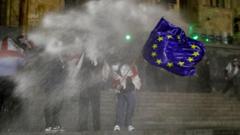Mass protests are sweeping through Georgia, where citizens are rallying against their government’s alleged abandonment of their European aspirations in favor of alignment with Russia.
Georgia's Protests: A Nation Torn Between Europe and Russia

Georgia's Protests: A Nation Torn Between Europe and Russia
Tensions rise as Georgians protest against government actions perceived as a shift towards Moscow.
As protests in Tbilisi persist, crowds are gathered in substantial numbers on Rustaveli Avenue, showcasing their defiance with flags and chants against the ruling Georgian Dream party. These demonstrations, which have now continued for several consecutive nights, reflect intense public frustration with the government’s increasing authoritarianism and perceived retreat from Western alliances.
Over the past few days, thousands of protesters have lined the streets of Tbilisi, calling for a return to a pro-European stance. The demonstrations erupted following allegations that the Georgian Dream party is undermining the nation’s hard-won path towards European integration, a claim that has led protesters to assert that a return to Russian influence is imminent. Vowing to stand firm, many participants express their intention to keep returning to the streets until their demands are addressed.
In a nation of just 3.7 million, feelings are running high, with local leaders asserting that Georgia stands at a critical crossroads. Many have echoed sentiments of being on the brink of losing sovereignty to Russian control. The situation intensified when Prime Minister Irakli Kobakhidze dismissed negotiations for European Union accession over the next four years, prompting not only public outcry but also criticism from international allies.
Clashes between police and protestors have escalated, with reports of injuries on both sides, as law enforcement employs water cannons and tear gas against demonstrators. Amidst the turmoil, human rights advocates are raising concerns over police brutality, alleging that detentions have resulted in serious injuries to activists and journalists alike.
The political landscape is increasingly polarized, with the government maintaining that they have been wrongfully accused of capitulating to Moscow, while protesters, galvanized by opposition leaders and a pro-Western figurehead in the presidency, label the current regime illegitimate following contested elections.
As protests continue despite the bitter cold, citizens across various Georgian cities join the cause, calling for the establishment of fair electoral processes under international supervision. Whether the government will heed these calls or further escalate their authority amidst rising dissent continues to remain uncertain, with citizens prepared to fight for their vision of Georgia’s future—either firmly pro-European or under Russian influence.
Over the past few days, thousands of protesters have lined the streets of Tbilisi, calling for a return to a pro-European stance. The demonstrations erupted following allegations that the Georgian Dream party is undermining the nation’s hard-won path towards European integration, a claim that has led protesters to assert that a return to Russian influence is imminent. Vowing to stand firm, many participants express their intention to keep returning to the streets until their demands are addressed.
In a nation of just 3.7 million, feelings are running high, with local leaders asserting that Georgia stands at a critical crossroads. Many have echoed sentiments of being on the brink of losing sovereignty to Russian control. The situation intensified when Prime Minister Irakli Kobakhidze dismissed negotiations for European Union accession over the next four years, prompting not only public outcry but also criticism from international allies.
Clashes between police and protestors have escalated, with reports of injuries on both sides, as law enforcement employs water cannons and tear gas against demonstrators. Amidst the turmoil, human rights advocates are raising concerns over police brutality, alleging that detentions have resulted in serious injuries to activists and journalists alike.
The political landscape is increasingly polarized, with the government maintaining that they have been wrongfully accused of capitulating to Moscow, while protesters, galvanized by opposition leaders and a pro-Western figurehead in the presidency, label the current regime illegitimate following contested elections.
As protests continue despite the bitter cold, citizens across various Georgian cities join the cause, calling for the establishment of fair electoral processes under international supervision. Whether the government will heed these calls or further escalate their authority amidst rising dissent continues to remain uncertain, with citizens prepared to fight for their vision of Georgia’s future—either firmly pro-European or under Russian influence.





















